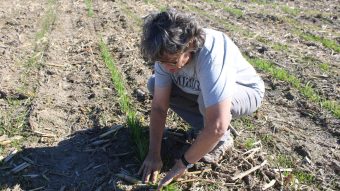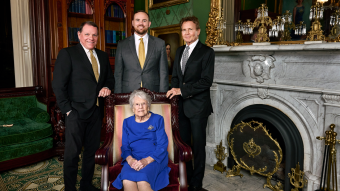Oct. 15, 2025
Contact: Cary Littlejohn, carylittlejohn@missouri.edu
Before journalism students graduate from the University of Missouri, many of them have already chased breaking news at a community newspaper, gone live on an NBC affiliate, edited longform stories for a monthly city magazine, covered statewide business news for a digital-only newsroom and reported on air at an NPR member station.
That’s because Mizzou blends classroom learning and real-world practice. It’s called the Missouri Method, and it dates back to 1908 when Walter Williams, the first dean of the Missouri School of Journalism, welcomed Mizzou’s inaugural class of journalism students into a model that combined formalized lessons with practical experience.
More than a century later, the Missouri Method has shaped not only generations of journalists but has also become part of Mizzou’s DNA. Today, every school and college on campus puts “learning by doing” into practice, giving students the confidence and real-world experience to succeed after graduation. Here’s a look at some of the ways the Missouri Method continues to shape education across Mizzou.
College of Agriculture, Food and Natural Resources
CAFNR students might have a claim on the tastiest and most colorful hands-on experiences at Mizzou.
They learn business and food science while making and selling Buck’s Ice Cream. At the Mizzou Meat Market, students learn how to produce quality cuts of USDA-inspected meat while developing entrepreneurial skills. In the MU Nutritional Center for Health, known as the MUNCH Lab, students test recipes and study the nutritional value of food in a 3,000-square-foot state-of-the-art research facility. And at Tiger Garden, the student-run flower shop on campus, they design and sell floral arrangements to customers.
College of Arts and Science
In the College of Arts and Science, students do the hard work that shapes cultural experiences for Mizzou and beyond. For nearly 50 years, the Missouri Review has been one of the country’s leading literary magazines — and it’s powered by students. In theater, students bring stories to life on stage, not only as actors but also directors, designers and choreographers. Through the School of Music’s Community Music Program, music majors step into the role of teachers, giving lessons to community members of all ages.
From publishing and performing to teaching and creating, students studying the arts at Mizzou turn classroom lessons into experiences that reach real audiences long before graduation.
College of Education and Human Development
Education students at Mizzou don’t just learn about teaching; they practice it.
Through the Senior Year On-Site Program, future teachers spend an entire year placed in local schools, gaining experience in every part of the profession. Early childhood, elementary and special education majors step into real classrooms, planning lessons, working with students and learning directly from mentor teachers. There’s also a special AVID Mentoring program that allows Mizzou students to serve as mentors to local middle and high school students.
Outside of the school day, education students serve as site assistants for Adventure Club, an enrichment-based program for elementary students enrolled in Columbia Public Schools. And on campus, Mizzou students help out at the Child Development Laboratory, a full-day, year-round lab school, where they work with young children and train alongside faculty.
By the time they graduate, Mizzou education students have already spent countless hours teaching and leading in real classrooms.
College of Engineering
From prototypes to finished projects, students in Mizzou’s College of Engineering learn by building. Every lab offers space to test, tinker and create.
In the 3D Printing Research and Experiences Lab, students design and produce prototypes with cutting-edge printers. Inside the Computer Assisted Virtual Environment, or CAVE, they use motion sensors and virtual settings to model weather patterns, molecular structures and even cityscapes. In the Autonomous Systems Lab, students work with Boston Dynamics dog-like robots. And in the Industry 4.0 Lab, students gain hands-on experience with integrated industrial controls, automation and advanced manufacturing technology.
Across the college, students are also exploring the deep neural networks behind artificial intelligence and machine learning — gaining experience with the technology that will define the future.
College of Health Sciences
The College of Health Sciences is home to countless opportunities to learn in real clinical settings.
In the Respiratory Therapy program, students log more than 1,000 hours of hands-on training to prepare them to become registered respiratory therapists who assess, diagnose and treat patients with breathing-related conditions.
Other programs give students direct experience serving the community. At PhysZOU, physical therapy students provide free care under faculty supervision. At Tiger OT, occupational therapy students help clients of all ages who suffer neurological, musculoskeletal or developmental disorders. The Combs Language Preschool allows students to work with preschoolers who have speech and language needs. And at the Integrative Behavioral Health Clinic, students gain experience supporting clients facing mental health challenges.
Whether they’re in a clinic, preschool or community program, health sciences students put training into practice.
College of Veterinary Medicine
Most veterinary schools follow a 3+1 model, with three years of classroom instruction followed by a year of clinical experience.
Not at Mizzou. The College of Veterinary Medicine uses a 2+2 format: two years in the classroom, then two years in clinical settings. This approach lets students start working with animals — and their humans — a full year earlier than at most other schools and gain twice the hands-on clinical training before graduation. At Mizzou, hands-on learning starts from day one. In addition to classroom work, students apply their skills through nearly 30 clubs and organizations that offer real-world experience with everything from cows to raptors, dogs, horses and more. Every year builds on that foundation, culminating in two full years of clinical rotations where students provide direct patient care alongside faculty veterinarians.
By graduation, Mizzou veterinary students have cared for pets, livestock and wildlife — gaining the real-world experience and confidence to make an immediate impact from day one of their careers.
Missouri School of Journalism
The Missouri Method started at the Missouri School of Journalism, and it’s still used today to ensure students get in-depth training.
Those drawn to political reporting can cover state government through the Statehouse Reporting Program. Aspiring meteorologists can forecast the weather on air. And sports reporters have the opportunity to cover high school and college games from the sidelines.
Students interested in strategic communications also dive into real-world projects. They work with paying clients on marketing proposals, advertising campaigns, rebranding projects and more — building strong portfolios before they graduate.
Robert J. Trulaske, Sr. College of Business
Business students at Mizzou have plenty of opportunities to jump straight into the world of business.
In the Inside Sales Lab, students generate new business opportunities, conduct market research, grow brand awareness and build account relationships on behalf of corporate partners.
The Center for Entrepreneurship and Innovation provides aspiring entrepreneurs with space to explore, learn, build, and share new ideas and business innovations. And the Entrepreneurship Alliance helps students launch their own ventures, tackling real business challenges, such as identifying customer segments, developing prototypes, testing ideas, and setting up legal structures and operating agreements.
By graduation, Mizzou students already know what it takes to grow ideas into thriving businesses.
School of Law
Mizzou School of Law students start working with clients through legal clinics. Mizzou offers students four client-serving clinical experiences under the supervision of licensed attorneys.
Students in the Child and Family Justice Clinic provide free legal assistance in domestic matters such as orders of protection, child custody and adoption. In the Criminal Practice Clinic, they are placed in local public defender and prosecutor offices, where they assist with ongoing cases. The Entrepreneurship Legal Clinic supports small businesses across the state with setup, contracts, intellectual property, regulatory compliance and more. And through the Veterans Clinic, students provide free legal services to veterans seeking discharge upgrades or navigating Department of Veterans Affairs disability compensation claims.These experiences give law students the opportunity to practice real advocacy while making a tangible difference in the lives of clients.
School of Medicine
Medical students at Mizzou don’t have to wait until residency to treat patients. They gain real experience through MedZou, a student-run, physician-supervised clinic that provides free health care to uninsured residents in mid-Missouri. Every Thursday evening, students staff the primary care clinic, seeing patients, helping to diagnose conditions and developing treatment plans. They also rotate through specialty clinics, such as dermatology, ophthalmology and neurology.
By serving real patients with real needs, Mizzou medical students learn what it means to practice medicine with the support of professional mentors.
Sinclair School of Nursing
At Mizzou’s Sinclair School of Nursing, every student completes more than 800 hours of clinical rotations before graduation.
For the first three semesters, students enjoy small class sizes — eight students for every clinical instructor — learning skills they need to become a nurse. In their final semester, they are paired with a professional nurse mentor to continue their hands-on education in real health care settings.
Clinical hours include direct patient care in a wide range of settings. Nursing students rotate through psychiatric mental health units, community outreach programs such as Mobile Aide, local hospitals, clinics and schools across Missouri.
Before even entering the profession, Mizzou nursing students have already spent hundreds of hours caring for patients, building the clinical skills and critical thinking needed to thrive in a fast-paced, high-reward profession.
Honors College
Honors College students have numerous opportunities to dive straight into research starting their first semester on campus.
Through the Discovery Fellows program, students receive a scholarship to work alongside faculty, building critical thinking skills and exploring potential career paths. The ASH Scholars program, offered in partnership with the Office of Undergraduate Research, places students on faculty-led research teams in the arts, social sciences and humanities.
Honors students are encouraged to think outside of the classroom, too. They can turn internships, service projects and study abroad experiences into credit hours. The Honors College also offers a Learning-by-Contract program that allows students to develop their own projects during a semester, making their education as flexible and individualized as their goals.
From reporting to robots to raptors, the Missouri Method gives every Mizzou student the opportunity to learn by doing — and to graduate ready for what comes next.









